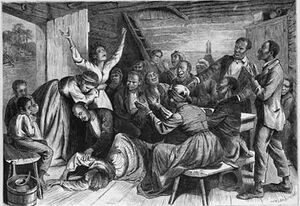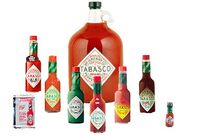Southern United States
Southern United States Dixie Da Souf | |||
|---|---|---|---|
| |||
| Motto: Deo vindice | |||
| Anthem: "Sweet Home Alabama" by Lynyrd Skynyrd | |||
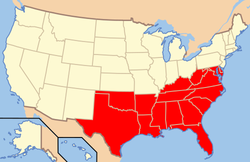 Jesusland is shown in red; the United States of Abortion and Commies in yellow. | |||
| Capital | Punishment | ||
| Official language(s) | Twang | ||
| Government | If this law was good enough for Jesus, it's good enough for you. | ||
| National hero(es) | Robert E. Lee, Hiram Wesley Evans | ||
| Currency | Wal-Mart coupons | ||
| Religion | Christians who sing and dance too much, Christians who don't believe in dinosaurs | ||
The Southern United States is the part of the United States in, well, the South. It is an agrarian land steeped in a rich history, which most state legislators are furiously trying to sweep under the rug by removing the Stars and Bars from state flags and such. It is an inviting tourism destination for other Americans who want to recall a simpler time, without modern distractions such as women's rights and the need to call the plumber.
The region is an entertaining glimpse into a world run by black folk and white folk, without the racial homogeneity attendant in visiting the Northeast. White Southerners are known as rednecks because their necks are often sunburnt, and the South is full of "red states" because the region's politics are so conservative — not in the sense of wanting to limit the government, but of using it to conserve the institutions of the year 1861.
History[edit]
Antebellum history[edit]
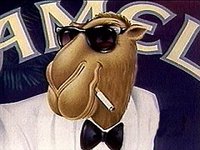
The Old South comprised five of the original 13 American colonies. These Southern Colonies were "royal colonies," ruled by a Governor appointed by the King of England. The allure of the South was that sunny land, where stuff other than rocks grew, was perfect for growing tobacco. Sir Walter Raleigh tried unsuccessfully to start a Southern colony before switching to manufacturing bicycles. He was followed by Lord Chesterfield, Lady Parliament, Duke Lucky Strike, and the much more successful Baron Joe Kool (pictured at left).
It was this devotion to agriculture (or to the herb that would become known as "Demon Weed") that gave rise to the quaint tradition for which the South is known: The buying and selling of human beings to work the fields and sing minstrel songs. Only America's newest newbies would believe that being treated as property was a natural state of affairs, and most of these were black. Eventually, negritude became a useful way to identify Southerners who had no rights.
The region's shoals and rocks made it hard to approach from the sea, so most new citizens came down Interstate 95, the predecessors of our modern "snowbirds," and without even the attraction of Grapefruit League baseball in the springtime. Happily, South Carolina had better harbors and became the destination for cargoes of Negroes eager to till the fields.
The settlers had many reasons for moving to the South. These included:
- Escaping their debts.
- Escaping the need to pay their personnel.
- Escaping people who thought their religious beliefs were a little strange.
- Escaping places that were so popular as to cost a lot of money to live there.
James Oglethorpe established Georgia as a regional center of such escapism. He prohibited slavery, rum, and repayment of debts. Georgia was to be a place where the only thing that remained legal was working hard. Or purchasing someone and watching him work hard. Oglethorpe's colossal experiment in social engineering was a colonial version of Disney World before it flopped with a thud.
The inland boundaries of the Southern States were largely undefined, and many citizens moved Westward, hoping to remain in the state to continue to support their favorite U.S. Senator and take the local newspaper. Imagine their surprise on finding out that the delivery boy had red skin and what he brought with him was not the Metro Edition.
The Civil War[edit]
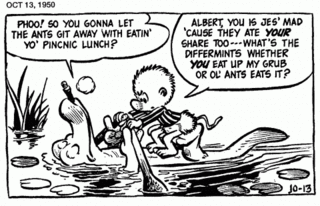
The South and the North took center-stage in American History with a brief midlife crisis known as the Civil War. The "Civil War" was not civil, although of course no war is (except for that dust-up in the Falkland Islands, where the biggest incivility was over whether or not to call them the Malvinas). Likewise, a "Civil War" refers to a war within a single country, whereas Southerners insist that they were a separate country. Many claim that no one knew, on agreeing to enter a continental federation, that they would be shot to death when they tried to leave it. (Hopeful residents of the European Union, take note.)
Indeed, in 1861, the South declared itself the Confederate States of America with its own President, Jefferson Davis. Davis was the great-great-great-grandfather of George W. Bush and thus shared several genes with recurring disastrous effects when applied to statecraft. However, Southerners preferred Davis to the alternative, U.S. President Abraham Lincoln, on the grounds that Davis did not have a dumb-looking beard or a silly hat. Little did they know that Davis would rival Lincoln's inability to prevent a war by inability to finish one.
American children are taught that this war was over slavery, to free the Negroes, and fought because "united we stand, divided we fall." That's crap, of course. The only thing the North knew about the Negroes is that they worked cheap, and consequently, Southern cotton and tobacco was undercutting the local producers, and slave labor was undercutting our kids' wages. Also, my Senator needs to make a name for himself and say he is "doing something" before "it is too late." The War on Cheap Labor was fought to establish two bedrock American principles which still serve the nation today:
- Absurd expansion of federal power, and
- Starting wars on false pretenses.
After a few years of back-and-forth just to make it sporting, the North found a general, Ulysses S. Grant, who was an expert at the South's forté (binge-drinking) and turned the war into a rout. The Confederate States surrendered and Lee's total pwnage commenced at Appomattox Court House. However, in the Southerners' minds, they in fact won this War of Northern Aggression (morally), and would "rise again" someday or other. Like Utah regarding polygamy, the Confederacy consented to re-enter the Union and abolish the region's own sacrament, slavery, while continuing to practice it in private and discreet ways.
Reconstruction[edit]
What followed was a period of delightful humiliation of the South. Three Constitutional Amendments made illegal the very things the South loved the most. Congress debated what to do with the leaders of the rebellion, how to rearrange the legislatures of the South so they were full of Negroes and Northerners, and how the Southern states could be given back their seats in Congress so as never to have any influence. It was a heady time of American-against-American mortification. The era's Carpetbaggers make modern Teabaggers seem like a weak imitation, and eventually let even Hillary Clinton claim there was nothing shocking about moving to New York just to get into the U.S. Senate.
The New South[edit]
In the years since Reconstruction, the New South has gradually gone back to its roots — underpaid menial labor — with the creation of Wal-Mart in the state of Arkansas. The South has deftly sidestepped the slavery question by "offshoring" all the slaves to mainland China. With the invention of the "Supercenter," the South seeks to dominate the United States with sweatshop-made potato peelers as it could not do with force of arms.
Nevertheless, the South's two major products are under siege: Tobacco is under attack with the passage of a new dollar-a-pack tax "for the children" nearly every year; and so is cotton, by the twin scourges of Ban-Lon and polyester. The South is acutely aware that the only time anyone ever took it seriously involved secession and a shooting war.
Geography[edit]
“D.C. is a city of Southern efficiency and Northern charm.”
The OG South is roughly identified as the eleven states that made up the Confederacy during the Civil War: South Carolina, Mississippi, Florida, Alabama, Georgia, Louisiana, Texas, Virginia, Arkansas, Tennessee, and North Carolina. Border states below the Mason-Dixon Line — Kentucky, Missouri, West Virginia, Maryland, and Delaware as well as the District of Columbia — had their cake and ate it too by permitting slavery during the war but remaining with the Union. Oklahoma at this time was not a state but a Confederate-aligned Indian territory.
The Census Bureau continues to define most border states as part of the South, though some would preferably toss Maryland, Delaware, and D.C. in with the Northeast or Mid-Atlantic. Poor ol' Missouri is boot(heel)ed out of the South under most modern definitions, instead being placed in the Midwest (despite their Southeastern Conference membership). Due to an ever-increasing presence of Yankee transplants, folks from the Deep South (Georgia, Alabama, South Carolina, Mississippi, and Louisiana) may regard some or all of the other "Southern" states as being...well, not so Southern, so context matters.
Culture[edit]
Language[edit]
“Kin ah git me a huntin' license he-ah?”
The traveler quickly becomes aware that what is spoken in the region is not exactly English. It is not "lilting" — that would be British English. It is not authoritative-sounding — that would be the language of the Midwestern United States. It is not carefree — that is the English of the valley girl. It is simply wrong.
The South's main change to the set of English phonemes is never to make the "th" sound, as sticking one's tongue out, under any circumstances, could be seen as an insult and involve oneself in a fight in the parking lot. If you have taken too big a bite and food is about to fall out of your mouth — just let it go, and live to chew another day. The "ng" sound is mostly a casualty as well, as illustrated in the quotation just above. Also the "lf" sound, which is not used in words of seff reffrence. The dialect is so hostile to double consonants that you would think they'd warm up to Mexicans.
The South's only change to the rules of grammar is a new pronoun for the second person plural:
| Case | Normal | |
|---|---|---|
| Nominative | youse | y'all |
| Possessive | youse's | y'all's |
| Objective | youse | y'all |
However, a variety of words are different. For verbs, one commences to fixin' to fetch hisseff da new ones. Ah reck-kun.
The names for many things are different, mostly on account of the different foodstuffs available in the region (see below). If the traveler confines himself to Taco Bell or even KFC, he can avoid this little lesson in tongues that could be painful on both ends. Obscenities are different from in the rest of the United States, as dealt with briefly in the article on Jam Jesus.
Terms of address include "Sir" and "Ma'am", which are used so religiously that you will constantly be looking down at your hands to make sure again that you are not carrying a whip. Happily, at least, the South is a region where blacks don't speak a dialect profoundly different from whites. This evolved as a defense mechanism to keep people from hanging up the phone on them.
Names for people[edit]
As elsewhere, Southern given names include a first and a middle name. Unlike elsewhere, the first name is often two words, even when the second word of the given name was never given. Thus, a Southern gentleman may be Bobby Joe, Billy Joe, Jamie Lee, Billy Bob, Bobby Bob, Joey Joe, and so on. In most cases (sometimes with cutesy spelling), a Southern lady can also have all of the above names. Men, however, will also have endearing nicknames, such as Gomer or Goober. If you don't know a Southerner's nickname, you can simply call him Buddy, as they all answer to that.
It is so easy to identify a black man by his surname that they might as well be Jews. African Americans just after slavery selected surnames of U.S. Presidents who served before slavery, just to keep all their bases covered.
The caste system[edit]
“The belle is a product of the Deep South, which is a product of the nineteenth century and the Age of Romanticism. Virginia is a product of the eighteenth century. It's impossible to extract a belle from the Age of Reason.”
Southern society is rigidly hierarchical (note the use of "Sir" and "Ma'am" mentioned above). The hierarchy has the following components:
- Parents outrank their children; also anyone else's.
- Men outrank women, though unlike some places, the women do not have to walk a respectful distance behind their men.
- White folks outrank black folks, of course.
- And the employer outranks the employee.
The ranking person, through a type of noblesse oblige, is responsible for maintaining and improving the behavior of his juniors, with the occasional bitch-slap or whipping.
At the bottom of the pecking order is the teenage boy. He has no one to gang up on — even younger children and most girls being exempt from the caste system — except the family pet, which he can kick with impunity. This is the case until the outsider ambles into town. The outsider is amazed that all the local children politely call him "Sir," until they finish studying him and remark that, with shoes like that, he must be some kind of faggot.
The rude treatment of Yankees (even by Southerners who don't know from baseball), of Mexicans, of all other foreigners, and of anyone else who might be one on first glance, should not be mistaken for hatred. It is merely a warm Southern welcome to someone new who is going to occupy that formerly vacant space at the very bottom of the pecking order.
Cuisine[edit]
“Kin ah git anutha heppin'?”
Southern cooking (known as vittles) accounts for many of the linguistic digressions from standard American English. Vittles is based on the foods available in the region, notably okra.
The principal vittle is chitlins. Like its foreign cousins, menudo and haggis, it is best enjoyed if the diner will open his mouth and close his mind.
A prominent subdivision of Southern vittles is Cajun vittles. Cajun cuisine features "blackened" dishes; that is, entrées seasoned by buckshot, as a result of goin' out to shoot yo' seff some vittles.
A typical week in the South[edit]
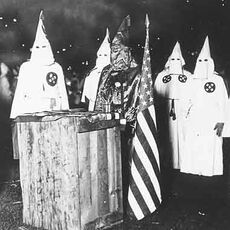
“Kin ah git an Ay-men?”
Southern life follows a regular seven-day cycle. Monday through Friday consists of doing work (or, again, watching and sipping Mint Juleps as your Boy does work). This part of the week is not unlike life elsewhere in the United States (apart from the Mint Juleps and Boys). On Saturday and Sunday, however, the Southerner engages in activities that are also seen, but with nowhere near the prevalence, in other parts of the U.S.:
- On Saturday, the Southerner goes to any junction of two state highways, stops at the tavern there, stays all evening (even when there is no college football on television) and gets thoroughly, knee-walking drunk. But not too drunk to taunt several policemen, turn over a few cemetery headstones, get in a fistfight, and usually knock up his neighbor's wife.
- On Sunday, the vast majority of Southerners spend the morning "duded up" in their favorite churches. Churches in the South do not include the North's "value-free" denominations such as Unitarian Universalism and Judaism. The South's churches are full-strength religions, such as the Baptist Church, full of fire and brimstone.
Neglecting the unremarkable "work" portion, this weekly life cycle of the Southern United States is known in brief as: "Sin. Repent. Repeat."
Ingesting large amounts of Southern Comfort sometimes leads a Southerner to confuse his neighbor's wife with his 13-year-old daughter. These faux pas are rectified not through church services but by a civil ceremony unique to the region: the shotgun wedding.
A Southerner meeting a stranger will want to quickly find out three things: Name, occupation, and "What church do you belong to." The stranger should give some reply other than Baha'i.
In the Western part of the region, churches are gigantic institutions, equipped with enough projection televisions to, in theory, take in an entire NCAA game day. Sociologists Firesign Theatre noted the region's largest church, Pastor Rod Flash's Powerhouse Church of the Presumptuous Assumption, in one of their award-winning radio documentaries. These churches compete with one another not just with shouting pastors but through the metric of chrome, just as many of their parishioners try to best each other's cars in the parking lot.
Politics[edit]
Since Reconstruction, the South has played a prominent role in national politics, from the moment the first backyard distiller chased away federal "revenuers" with his twenty-gauge.
The astonishing tendency of the television networks to represent the slightly-less-Communistic political party with the color red owes to the prevalence of Republicanism in the Land of the Redneck. Southerners began to be known as rednecks when the first generation of moonshiners were driven by the revenuers to murderous rage, rage that made not only their faces but their necks blush. Modern African Americans recall that "Lincoln freed the slaves," and a full 5% of them are dependable voters for the GOP.
The political influence of the South has recovered since Reconstruction, as the Southern states are no longer able to count black people as only three-fifths of a person. The South has attained a full set of Congressmen and U.S. Senators (though no one can yet understand them) and a Department of Agriculture all its own. It ensures that a decent amount of Free Money is diverted to the South, though most of it is in the form of food stamps. In addition, the Army Corps of Engineers helpfully flooded out enough farms to convert the state of Tennessee into a gigantic reservoir, opening it up as a tourist destination for Northerners with power boats. Every Presidential campaign since that of Richard Nixon has to include a "Southern strategy" that will explain to Southerners how it will serve their interests to elect a detached Northern millionaire who occasionally fakes a Southern accent.
Economy[edit]
Looking ahead, the economy of the Southern states must diversify from its traditional reliance on tobacco. A promising option is Tabasco. This spicy sauce is spelled similarly, is just as addictive, and there are no secondhand effects, apart from occasional spillage on tablecloths and neckties. As both the sauce and the state are part of Mexico, it may have a role to play. However, haggling with Mexicans is surprisingly easy when you are in the South.
See also[edit]
| ||||||||||||||||||||



